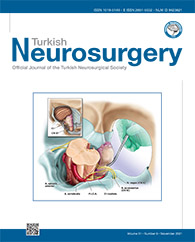2Medibafra Hospital, Department of Neurosurgery, Samsun, Turkey DOI : 10.5137/1019-5149.JTN.32714-20.2 AIM: To investigate the levels of vascular endothelial growth factor (VEGF) in the brain, and its soluble forms, namely sVEGFR1 and sVEGFR2, levels in the plasma of rats after cerebral ischemia.
MATERIAL and METHODS: Rats were divided into three groups as follows: Group 1: Sham-operated group, Group 2: Complete occlusion of the right carotid artery, Group 3: Complete occlusion of the right carotid artery and temporary occlusion of the left carotid artery for 10 min. Blood samples were collected on days 0 and 10 prior to the sacrification to measure the sVEGFR1 and sVEGFR2 levels. On day 10, animals were sacrificed, and brain tissue was collected to analyze VEGF expression.
RESULTS: Postoperative sVEGFR1 levels reduced significantly in Group 3, while it remained stable in other groups. sVEGFR2 levels did not change in any group. Although VEGF staining scores in the groups that underwent ischemia procedures increased compared to group 1, no significant differences were observed.
CONCLUSION: Decreased levels of sVEGFR1 can be a mechanism contributing to angiogenesis in arteriovenous malformations by increasing the levels of VEGF available to bind membrane-bound VEGFRs.
Keywords : Angiogenesis, Arteriovenous malformations, Cerebral ischemia, Vascular endothelial growth factor, VEGF, Rats




